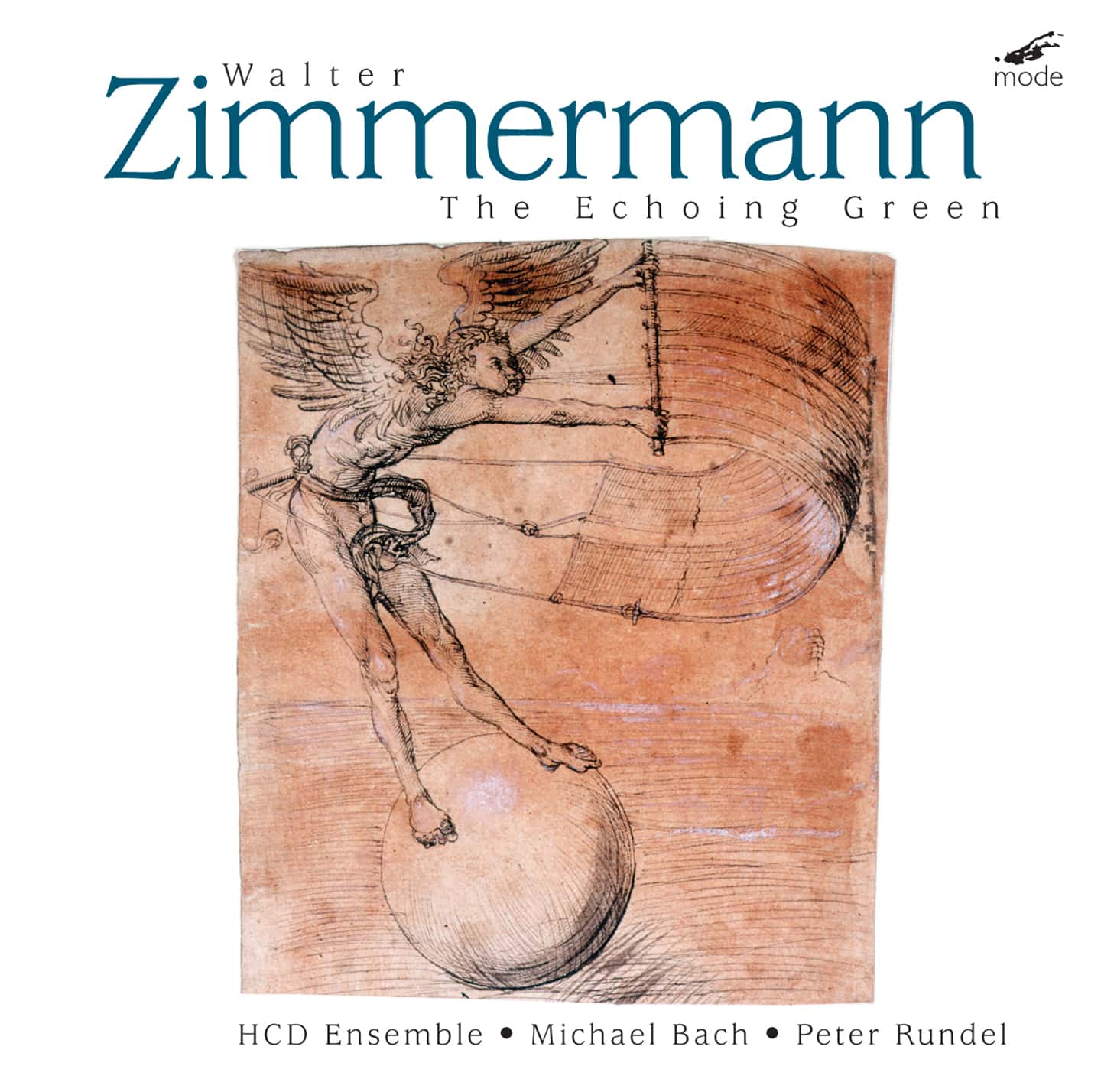The Echoing Green
HCD Ensemble and guests
Wüstenwanderung (1986) (20:55)
for piano
Hermann Kretzschmar, piano & voice
Geduld und Gelegenheit (1987-89)
for cello and piano
Hypneros (for Morton Feldman) (6:03)
Sala della Pazienzia (11:51)
Tyche (5:43)
Michael Bach, cello
Hermann Kretzschmar, piano
Lied im Wüstenvogelton (1987) (12:13)
for bass-flute and piano
Dietmar Wiesner, bass-flute
Hermann Kretzschmar, piano
The Echoing Green (1989) (13:19)
for violin and piano
Peter Rundel, violin
Hermann Kretzschmar, piano
Like Morton Feldman, whose music he acknowledges as an influence, Zimmermann (b.1949) is fascinated by the relationship between painting and music, and how material of an apparently simple nature played by apparently “normal” instruments is capable of almost infinite subtlety.
Frankfurt’s HCD Ensemble are also members of Germany’s infamous Ensemble Modern. They are joined here by the superb violinist Peter Rundel and cellist Michael Bach.
Wüstenwanderung [Wandering in the desert] is almost unplayable because the superimposed layers – which have their own tempi and encompass the entire pitch range of the piano, producing a constant crossing of lines.
Geduld und Gelegenheit [Patience and opportunity]. The cycle deals with a Renaissance hieroglyph, the reading of which leads to the conceptual range of opportunity, time, virtue, happiness, patience.
Residua 1: Lied im Wüstenvogelton [Song in the Tone of a Desert Bird]. The bass flute sounds out the tones of a children’s song in infinite slowness. The pianist whistles the original in brief fragments. Otherwise the song only emerges in transformations, which eventually make room for a new song.
Residua 2: The Echoing Green. The children’s song “Ich bin das ganze Jahr vergnügt” [I am happy all year long] serves as a basis for a process of transformation and dissolution, whereby it never emerges in its original form anywhere in the piece.
Reviews
Walter Zimmermann
The Echoing Green – Chamber Works 1986-89
Mode 150
The one thing you’re likely to know about Walter Zimmermann from reading reviews of his work (mine included) is that he edited the writings of and has been a consistent champion of the music of Morton Feldman. But anyone expecting to hear any direct influence of Feldman in Zimmermann’s own music will probably be disappointed; Richard Toop, in his splendid essay accompanying these four late 1980s works by the 56-year-old German composer (how many more wonderful pieces are there languishing in obscurity nearly two decades after their creation?!) also draws attention to the composer’s wide reading – from Plato to Maeterlinck via St Augustine, Nietzsche, Beckett and Blake (hence the album title) – and his use of material derived from the folk music of his native Franconia. The transatlantic influence is harder to discern, but Zimmermann’s rhythmic rigour and fondness for consonance – or rather his reluctance to fall back on the harsh chromaticism beloved of his elders – reveal a deep understanding of and affection for early Cage. There’s something of the diaphanous lucidity of the 1950 Cage String Quartet in Four Parts (not to mention and the frozen pitches of early Wolff) in “Sala della Pazienzia”, the second movement of Geduld und Gelegenheit (“Patience and opportunity”), for cello (Michael Bach, using his specially-designed Bachbogen, allowing him to play on all four strings of the instrument simultaneously) and piano (Hermann Kretzschmar), but the first movement’s sustained exploration of B flat reveals a distinctly European aesthetic of fearsome complexity at work – even if it is dedicated to Feldman. Don’t be fooled by the fact that Zimmermann was associated with the “New Simplicity” movement in the early 70s into thinking this music is simple, either to listen to or to perform. This is nowhere more apparent than in the furiously difficult Wüstenwanderung (“Wandering in the desert”), a 21-minute solo piano work whose seven superimposed tempo layers give Kretzschmar one hell of a run for his money. Lied im Wüstenvogelton (“Song in the Tone of a Desert Bird”), for bass flute (Dieter Wiesner) and piano (the indefatigable Kretzschmar) and The Echoing Green, for violin (Peter Rundel) and piano (guess who) belong to a series of works entitled Residua, after Samuel Beckett, which the author described as “what is left over from larger original text units as well as from the entirety of an earlier work.” The “original text” in Zimmermann’s case being folk material in the form of two children’s songs, whose deceptive simplicity and strong melodic identity function as a structural springboard from which the composer launches himself into music of extraordinary subtlety – and virtuosity. The performances by all concerned are absolutely superb, and the disc makes a splendid companion to the earlier fine Zimmermann release on Mode, Schatten der Ideen. Let’s hope a third installment won’t be long in coming.
— Dan Warburton, www.paristransatlantic.com, February 2006
Links
Also by Walter Zimmermann on Mode Records:
Schatten der Ideen, performed by ensemble recherche (mode 111)
Songs of Innocence & Experience (mode 245/246)
Lokale Musik (mode 307/09, 3-CDs)
John CAGE: 16 Dances for piano (mode 259, as editor)
Also by Peter Rundel on Mode Records:
Giacinto SCELSI: The Orchestral Works 2 (mode 176)
Michael Bach profile
Peter Rundel profile
Walter Zimmermann profile
Walter Zimmermann Online

